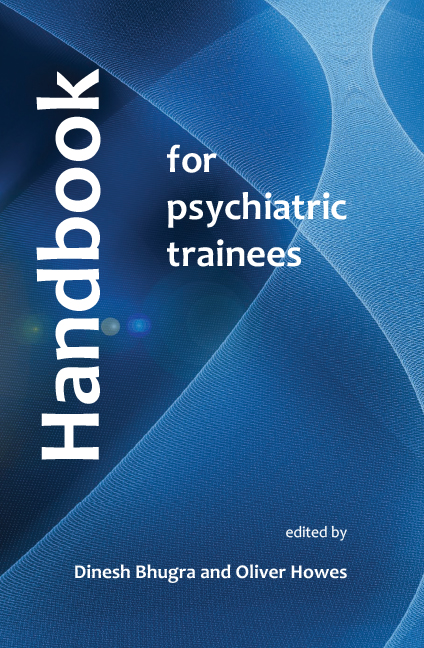Book contents
- Frontmatter
- Contents
- List of tables, boxes and figures
- List of contributors
- 1 Psychiatric training: the next steps
- Part 1
- Part 2
- Part 3
- 14 Personal safety
- 15 Managing violence
- 16 Managing difficult clinical situations
- 17 Understanding and managing stress
- 18 Managing time: the key to professional success
- 19 Negotiation skills
- 20 Presentation skills
- 21 Mental health review tribunals: reports and hearings
- 22 How to get published
- 23 Mental health informatics
- 24 Clinical governance
- 25 Lifelong learning and revalidation
- 26 Mentoring and shadowing
- 27 The MRCPsych examinations
- 28 Flexible training
- 29 UK training for overseas doctors and opportunities for UK doctors to train outside the EEC
- 30 Academic careers
- 31 Higher degrees
- Index
21 - Mental health review tribunals: reports and hearings
from Part 3
- Frontmatter
- Contents
- List of tables, boxes and figures
- List of contributors
- 1 Psychiatric training: the next steps
- Part 1
- Part 2
- Part 3
- 14 Personal safety
- 15 Managing violence
- 16 Managing difficult clinical situations
- 17 Understanding and managing stress
- 18 Managing time: the key to professional success
- 19 Negotiation skills
- 20 Presentation skills
- 21 Mental health review tribunals: reports and hearings
- 22 How to get published
- 23 Mental health informatics
- 24 Clinical governance
- 25 Lifelong learning and revalidation
- 26 Mentoring and shadowing
- 27 The MRCPsych examinations
- 28 Flexible training
- 29 UK training for overseas doctors and opportunities for UK doctors to train outside the EEC
- 30 Academic careers
- 31 Higher degrees
- Index
Summary
It is often said that an after-dinner speech is like a lady'sgarment: it should be of the right size and style, and appropriate to the occasion. A report too must match its requirements in much the same way.
There has been a steady rise in the number of compulsory admissions of people with mental illness over the past two decades, and a proportionate increase in applications to mental health review tribunals by detained patients (Wall et al 1999; Department of Health, 2002). The tribunal rules require an up-to-date medical report. Most clinicians find that writing these reports in time, and giving evidence at the hearing, a tedious and onerous addition to their busy work schedule, especially if they are unfamiliar with these tasks and have not had sufficient training. Some guidelines are offered below in an attempt to make the task easier.
The introduction of the Mental Health Treatment Act in 1930 encouraged people with mental illness to seek help voluntarily. This was reinforced in the Mental Health Act 1959, which also introduced two radical changes: the decision to detain patients against their will for treatment became a medical, rather than just a legal, matter; and the Act highlighted the procedures and safeguards concerning compulsory detention and treatment. Furthermore, Parliament and European Law decree that any decision to detain patients be subject to an independent review. The result was the forming of mental health review tribunals, which have a responsibility to review the lawfulness of detention of people with mental disorders and thus safeguard the person'sright to freedom from unjustified detention in hospital (Richardson & Machin, 1999).
No significant changes to the Mental Health Act 1983 were introduced in this regard before the remedial order of 2001, which addressed the problem of incompatibility with the law on human rights. This order shifted the burden of proof from the patient to the responsible detaining authority to show that the criteria defined in sections 72 and 73 of the Mental Health Act 1983 (described below) are not met, thus justifying continued detention.
It is now the duty of the responsible medical officer, as a representative of the detaining authority, to provide factual evidence in support of their clinical opinions justifying detention. It is no longer sufficient simply to express clinical opinions. Although the decision of the tribunal is legal, it is based on clinical information.
- Type
- Chapter
- Information
- Handbook for Psychiatric Trainees , pp. 195 - 202Publisher: Royal College of PsychiatristsPrint publication year: 2008



